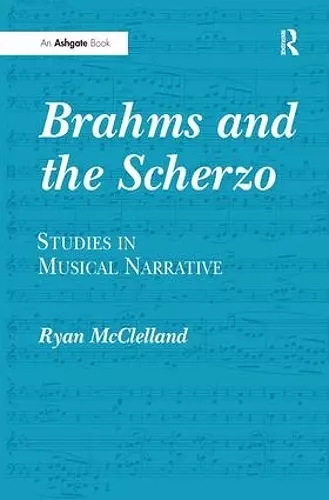Brahms and the Scherzo
Studies in Musical Narrative
Format:Hardback
Publisher:Taylor & Francis Ltd
Published:28th Jun '10
Currently unavailable, and unfortunately no date known when it will be back
This hardback is available in another edition too:
- Paperback£56.99(9781138262164)

Despite the incredible diversity in Brahms's scherzo-type movements, there has been no comprehensive consideration of this aspect of his oeuvre. Professor Ryan McClelland provides an in-depth study of these movements that also contributes significantly to an understanding of Brahms's compositional language and his creative dialogue with musical traditions. McClelland especially highlights the role of rhythmic-metric design in Brahms's music and its relationship to expressive meaning. In Brahms's scherzo-type movements, McClelland traces transformations of primary thematic material, demonstrating how the relationship of the initial music to its subsequent versions creates a musical narrative that provides structural coherence and generates expressive meaning. McClelland's interpretations of the expressive implications of Brahms's fascinatingly intricate musical structures frequently engage issues directly relevant to performance. This illuminating book will appeal to music theorists, musicologists working on nineteenth-century instrumental music and performers.
'McClelland has proved himself to be a tremendous musician and analyst in this audacious project...' Music Theory Online 'McClelland provides a thorough and enormously useful consideration of Brahms's approach to a specific set of compositional problems... In describing this process, McClelland has illuminated a unique approach and provided a set of analytical tools that can be employed in Brahms's instrumental output as a whole. Another significant contribution elucidates the correspondence between generic movement types and the structural and stylistic strategies employed by the composer. This includes the most sophisticated description of Brahms's intermezzo-influenced inner movements to date, particularly their penchant for greater thematic variety than most scherzos. Perhaps most important, the book supports recent recognition of the continuing validity of generic distinctions during the mid-and late nineteenth century, by implication refuting Carl Dahlhaus's claim of generic relativism in late romanticism... McClelland's book is unquestionably an essential milestone in Brahms studies that will surely be lasting and much cited.' Notes
ISBN: 9780754668107
Dimensions: unknown
Weight: 771g
336 pages